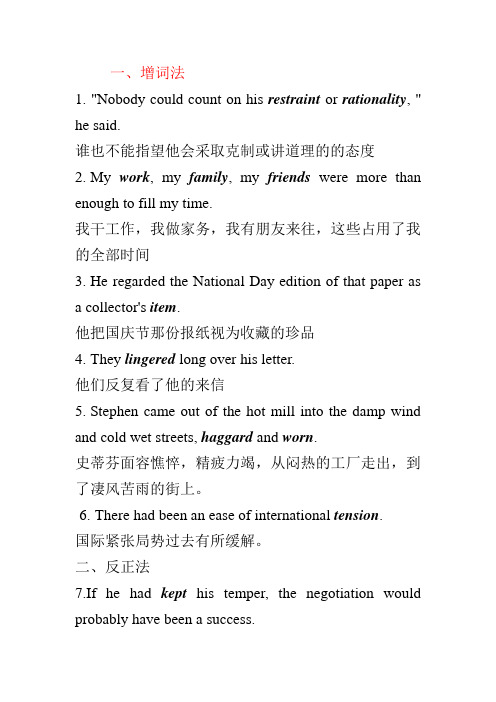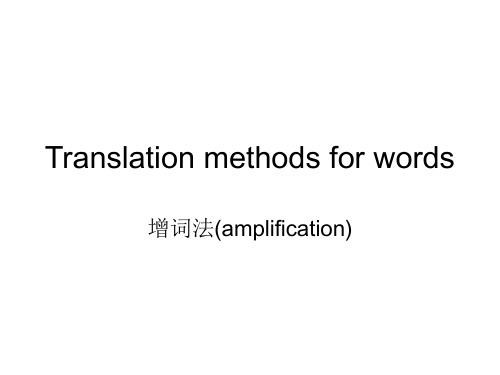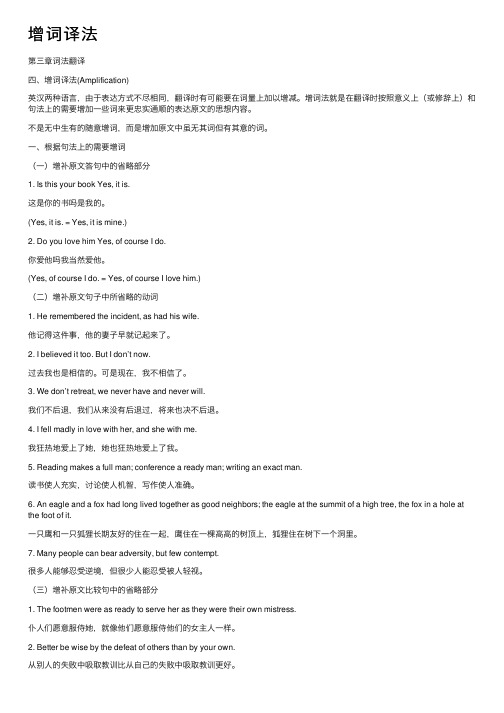增词法翻译练习.doc-for students
增词法翻译练习题

增词法翻译练习题㈠一. 试翻译下列各句, 注意在斜体名词前增加动词.1. They talked for almost eight hours, through dinner and well into the night.2. He favored the efforts to improve relations with all peace-loving countries.3. “Nobody could count on his restraint or rationality,” he said.4. My work, my family, my friends were more than enough to filmy time.二. 试翻译下列各句, 注意在斜体名词前增加形容词.1. “This is grasping at straws, I know,” said the hopeless man.2. With the meeting to begin in just a couple of hours, I had not the time to worry about such trifles.3. “It will make a man of him,” said Jack. “College is the place.”4. He regard the National Day edition of that paper as a collector`s item. 三.试翻译下列各句, 注意增加副词.1. Now and then his boots shone.2. A seagull saw the light from my window and darted up to it.3. They lingered long over his letter.4. He turned a chair around and straddled it, resting his chin on the back.四. 试翻译下列各句, 注意在斜体不及物动词后增加名词.1. He began to see things and to understand.2. He ate and drank, for he was exhausted.3. Stephen came out of the mill into the damp wind and cold wet street, haggard and worn.六. 试翻译下列各句, 注意在斜体名词前家表复数的词.1. Very acute problems exits among them.2. The U.S. had a brief period of regional feudalism during the period of slavery in the southern states.3. They drove in a black limousine, past groves of biech trees and endless rows of identical new buildings.七. 试翻译下列各句, 注意在斜体动词需要增加表时间的词.1. I knew it quite well as I know it now.2. Mother insisted to this day that she thought I was just joking.3. They has always been able to control things. Now control was getting away from all of them.八. 试翻译下列各句, 注意增加助词.1.” All that made this Christmas Day was my knowing it was,”.2. The little kid had brought with him his knife, scissors and so on.3. It was mostly small talk, but I would have very little of that Family news. Messages from sisters, nephews, nieces.㈡一. 试翻译下列各句, 注意增加适当的词.1. “How shall I do?”–“Just as you wish.”2. Sometimes their faces froze, sometimes their feet and their hands.3. Either you do it, or we will get somebody who will.4. Mr. Morrison took over as Director, Mr. White as Vice Director.二. 试翻译下列各句, 通过增词来表达原文中的含蓄条件句.1. Any leak, even at this late date, could have tremendous international repercussions.2. They would not have done such a thing without government approval.3. The bridge was painted a dull green color. Under any other circumstancesI probably would have found it ugly.三. 试翻译下列各句, 通过增词来表达斜体do/does/did 所代替的意义.1. He did not really represent their opinions to higher-ups, although he claimed he did.2. The guard inside the prison had no guns. But those in the towers did.3. I tired not to draw too much hope from the incident, but despite my resolve, I did.四. 试翻译下列各句, 通过增词使斜体的抽象名词具体化.1. His arrogance made everyone dislike him.2. Now birth control became a possibility.3. The vague restlessness since boyhood remained.4. There had been an ease of international tension.5. Preparations for the conference had been plagued by many problems.五. 试翻译下列各句, 注意在必要增加处增加概括词.1. They talked about inflation, unemployment and environmental pollution.2. Thus he grew in body and soul.3. All the facts concerning Mr. Powers family background, his upbringing, his personal experience, his social connections and his occupation have subjected to intensive study.六. 试翻译下列各句, 注意在必要增加承上启下的词.1. He stepped to the platform and paused: a little dingy station, a small crowd of travelers.2. Border formalities, the French offcials were polite and efficient, the Nazi authorities aloof and superior.重复法翻译练习题㈠一、选择下列个句,重复斜体的名词1.We would learn how to analyze and solve problems.2.It is our duty to rebuild and defend our home_land.3.asa good play serves to educate and inspire the people.4.It was he who first repudiated and breached the understanding.5.They would be very reluctant to postpone or cancel the meeting.二、选择下列句子,重复斜体介词前的名词.1.We caught a glimpse of the leading horses and of a horseman vanishingthrough the rain2.The prisoners often got into argument with each other or with the guard.3.Ignorance is the mother of fear as well as of admiration.4.The use of poison gas is a clear violation of international law inparticular of the Geneva Convention.5. He broke all connections with his past, and with the old society inevery way三、试翻译下列个句子重复斜体的动词1.People forget your face ,then your name.2.This requires care and , for difficult problems , great experience.3. I owned a town house , a car and a driver’s license to take myself about.4. They were starting from scratch and needed men, guns , training.5. He wore zippered for this campaign as they had for larger ones .四. 试翻译下列个句子,重复斜体介词前的动词.1. Then he spoke of the rise of charity and popular education , and particularly of the spread of wealth and work.2. Grammar deals with the structure of language , English grammar with the structure of English , French grammar with the structure of French, etc.3. They talked of things they longed for _of hot soup and of the richness of butter.4. They had prepared for this campaign as they had for larger ones .五. 试翻译下列个句子.重复斜体代词所代表的名词1. Ignoring a problem does not solve it .2. Smith seemed ill at ease with power, Ball sought it.3. But there are clues, and they seem to bear out my earlier suspicion.4. When her eyes looked up, they were very large, odd, and attractive.六.试翻译下列个句子,注意对斜体的代词运用重复手段.1. Big families had their own difficulties.2. Each had his own business to handle.3. Some were playing football, others were playing volleyball.4. Whoever works hard will be respected.练习题㈡一.试翻译下个句子,注意保持原文的重复手段1. It is impossible to live in society and be independent of society.2. This town is small town, looking much like other towns of its size, but few towns enjoy so many natural advantages.3. Dead is the monarch, dead the servant who cringed before him, dead the city in which they dwelt.4. If once virtue is lost, all is lost.5. Year after year and century after century the moon goes through its cycles.二.试翻译下列各句子,注意用同义词表达原文中重复的词1. Easy come, easy go.2. No pains, no gains.3. During their stay in Peking, they visited some old friends of theirs, visited Peking University and visited the Great Wall.4. She loved giving orders to the servents and they loved obeying her.三.试翻译下列各句子, 用两个在意义上相互补充的四字词组表达原文汇总斜体词.1. He showed himself calm in an emergency situation.2. The questions were evidently unexpected to the slow-witted spokesman, who instantly found himself tongue-tied.3. Instead we continued to embellish the cover story, walking blindly into his trap.4. With what seemed my last hope frustrated, I slipped into a deep lethargy.四.试翻译下列各句, 用四字重叠词表达原文中的斜体词.1. The toasts were flat.2. I was not evasive in my reply.3. A slanting sunlight dappled the grass.4. The farm buildings and the wheel-house were all dim and bluish.五.试翻译下列各句,用四字对偶词组表达原文中的斜体词.1. The trial, in his opinion, was absolutely fair.2. She is an awful fool of a woman.3. She told him of Johnsy’ s fancy.4. But at that time, she was the only woman here.六. 试翻译下列各句, 用同义词重复原文中斜体词1. Sam in the parlour, his boss was at lunch on chop and wine.2. His folks ate up everything he had.3. They might very well be preparing an attack against the country, hence their sizable build-up not only of troops, but of missiles, planes, and tanks along the border of the country.。
翻译技巧练习及答案:增译法及反正法

一、增词法
1. "Nobody could count on his restraint or rationality, " he said.
谁也不能指望他会采取克制或讲道理的的态度
2.My work, my family, my friends were more than enough to fill my time.
我干工作,我做家务,我有朋友来往,这些占用了我的全部时间
3.He regarded the National Day edition of that paper as
a collector's item.
他把国庆节那份报纸视为收藏的珍品
4.They lingered long over his letter.
他们反复看了他的来信
5.Stephen came out of the hot mill into the damp wind and cold wet streets, haggard and worn.
史蒂芬面容憔悴,精疲力竭,从闷热的工厂走出,到了凄风苦雨的街上。
6.There had been an ease of international tension.
国际紧张局势过去有所缓解。
二、反正法
7.If he had kept his temper, the negotiation would probably have been a success.
如果他没发脾气,这次谈判可能就成功了。
8. The two teams tied.两队不分胜负
9. His answer is beside the mark.他的回答文不对题。
Chapter 3 词汇翻译(二)for students

1)林则徐认为,要成功地禁止鸦片买卖,得首先把鸦片销毁。
2)徐悲鸿画马画得特别好。
3)你已经知道你想要什么。
(三)英汉形容词对比
2)这个古旧的小寨座落在青秀的群山之中。
3)清冷的夜空繁星密布。
2.名词的句法功能
在英汉语中,英汉语名词(名词词组)语法功能的差异在英语名词不能作谓语用,而汉语名词可以。例如:
1)明天星期天。
2)莎拉澳洲人。
3)小张上海人。
4)星期三春节。
5)大米五块钱一斤。
(二)汉英动词对比
1、形式变化
英语动词有丰富的词形变化,汉语动词没有形态变化,语法意义的实现由上下文、词汇(时间词、副词、助词等)、语调等体现。
归化:
内部颠覆者、起内部破坏作用的因素
异化:
特洛伊木马计
2)她在戏中扮演包公。
二、汉英词汇对比
(一)汉英名词对比
1、形式变化
英语可以直接用可数名词的复数形式来表达模糊的、不确定的数量关系,而汉语中,则要使用其他手段,如用数量词组、名词重叠形式以及带数字的固定词组等等来表达类似的意思。
1)一条条新修的公路把这个小镇和外界连在一起。
1、句法功能
英语句子的谓语只能是限定动词词组,其他词类不能担任谓语。汉语形容词可以作谓语,形成形容词谓语句例如:
汉语的形容词谓语句翻译成英语时,一般可遵循“增词原则”,增添适当的动词,以符合英语的句法结构。也可以遵循“词类转译原则”。例如:
1)她聪明,漂亮,又善解人意,大家都愿意接近她。
增词翻译法

1.根据语言特色结构需要增词
• A. 英译中时,增加原文语义上有而形式上无的成分,原文省略的成分, 表时态的词,名词复数的词,连词等。 • (1) With great progress in this field he remained modest and diligent. • 在这个领域他虽然取得了很大进步,但还是谦虚谨慎,勤勤恳恳。 • (3) “I’ll make a man of him,” said Jack. “College is the place.” • “我要把他培养成一个堂堂的男子汉,”杰克说, “大学就是一个理想的地 方”。 • (4) So teaching gives me pace, and variety, and challenge, and the opportunity to keep on learning. • 所以说,教学使我的工作有了节奏,生活变得丰富多彩,教学给我提 出了挑战,使我有了不断学习的机会。 • (5) Which do you like better, dictation or translation exercises? • 你喜欢听写练习,还是翻译练习? • (6) He never drinks before driving. • 他开车前从不喝酒。
Example
• “Histories makes men wise; poets witty; the mathematics subtle; natural philosophy deep; moral grave; logic and rhetoric able to contend.” • 读史使人明智; 读诗使人灵秀;数学使人周密; 科学使人深刻;伦理使人庄重;逻辑与修辞使人 善变。 • “班门弄斧” • This is like showing off one’s proficiency with the axe before Lu Ban, the master carpenter.
研究生英语翻译 增词法

• Better be wise by the defeat of others than by your own.
• 从别人的失败中吸取教训比从自己的失败中吸取 教训更好。 • He could understand a passive opposition from Kennedy loyalists, but an open one would have dire consequences. • 他了解到忠于肯尼迪的那些人在消极反对他,但 是如果他们公开反对,那就会产生可怕的后果。
• Air is a mixture of gases. • 空气是多种气体的混合物 • Of visible lights, red light has the longest and violet the shortest wavelength. • 在各种可见光中,红光的波长最长,紫光 的波长最短 • Things in the universe are changing all the time. • 宇宙中万物总是在不断变化的
• Jupiter generates more heat than it receives from the sun. • 木星发出的热量比它从太阳那里得到的热 量多。
• Plastic bowls marked microwavable are probably safer than those that aren’t. • 使用贴有“可用于微波炉烹调”标志的塑 料碗也许比使用没有贴这种标志的塑料碗 更安全 • The best conductor has the least resistance and the poorest the greatest • 最好的导体电阻最小,最差的导体电阻最大
增词译法——精选推荐

增词译法第三章词法翻译四、增词译法(Amplification)英汉两种语⾔,由于表达⽅式不尽相同,翻译时有可能要在词量上加以增减。
增词法就是在翻译时按照意义上(或修辞上)和句法上的需要增加⼀些词来更忠实通顺的表达原⽂的思想内容。
不是⽆中⽣有的随意增词,⽽是增加原⽂中虽⽆其词但有其意的词。
⼀、根据句法上的需要增词(⼀)增补原⽂答句中的省略部分1. Is this your book Yes, it is.这是你的书吗是我的。
(Yes, it is. = Yes, it is mine.)2. Do you love him Yes, of course I do.你爱他吗我当然爱他。
(Yes, of course I do. = Yes, of course I love him.)(⼆)增补原⽂句⼦中所省略的动词1. He remembered the incident, as had his wife.他记得这件事,他的妻⼦早就记起来了。
2. I believed it too. But I don’t now.过去我也是相信的。
可是现在,我不相信了。
3. We don’t retreat, we never have and never will.我们不后退,我们从来没有后退过,将来也决不后退。
4. I fell madly in love with her, and she with me.我狂热地爱上了她,她也狂热地爱上了我。
5. Reading makes a full man; conference a ready man; writing an exact man.读书使⼈充实,讨论使⼈机智,写作使⼈准确。
6. An eagle and a fox had long lived together as good neighbors; the eagle at the summit of a high tree, the fox in a hole at the foot of it.⼀只鹰和⼀只狐狸长期友好的住在⼀起,鹰住在⼀棵⾼⾼的树顶上,狐狸住在树下⼀个洞⾥。
翻译方法之增词法与减词法

翻译方法之增词法与减词法一、增词法1.增补代词和名词在翻译中,为了保证译文语法结构的完整性,需要增加和补充做主语的代词、名词。
例一:要有把握,就要有准备,而且要有充分的准备。
译文:__________________________________例二:许多年轻人响应了国家开发西部的号召,到西部去创业。
译文:__________________________________2.增补连词例三:虚心使人进步,骄傲使人落后。
译文:__________________________________3.增加介词例四:我们应该逐步消灭城乡差别。
译文:__________________________________4.增加表示具体概念的词在翻译过程中,为了使译文意义明确,将意思概括性变为具体补充性概念。
通常使用在注释性用语中如:典故、谚语、术语及简化说法在翻译时作补充说明。
例五:班门弄斧译文:__________________________________例六:四世同堂译文:__________________________________5.增加范畴词、原文暗含的词、注释性的词为了使翻译更加能明确地表达出原文的意义,使翻译的意义更加明确。
需要在翻译过程中加入一些范畴词、原文暗含的词、注释性的词等。
例七:台湾是中国的领土。
译文:__________________________________例八:全国人民总体上实现了由温饱向小康的跨越。
译文:__________________________________以上两句分别添加了表示范畴的part 和暗含意义的词stage。
二、减词法减词法是把中文中出现的词语,但在翻译的过程中不需要的词语进行省略的方法。
这种省略一般是由于译文中语意已经涵盖了可省去的部分,或是由于汉英语法、修辞或习惯表达法上的差异。
但是省略绝不是把原文的某些思想略去不译。
减词法分为以下几种:1.省略中文中重复出现的词语例一:经济全球化使南北的发展差距、贫富差距进一步扩大。
增词法——精选推荐

增词法增译法 amplification试译以下句⼦:1.I’m looking forward to the holidays.我期待着假期的到来。
2.She bought a Shanghai last week. 上周她买了⼀辆上海牌汽车。
3.After the football match, he’s got an important meeting.在观看⾜球赛之后,他有⼀个重要会议要参加。
4.We can learn what we did not know. 我们能够学到原来不懂的东西。
5.I could knit when I was seven.我七岁时就会织⽑⾐。
6.Some metals are easy to machine; others are not.⼀些⾦属容易加⼯,⽽另⼀些⾦属却不容易。
7.我不爱喝饮料。
I don’t like soft drinks.8.⼈和动物不同。
Man is different from other animals. 定义:增译法就是在翻译时根据意义上或修辞上或句法上的需要增加原⽂中虽⽆其词但有其义的⼀些词,使得译⽂忠实表达原⽂的信息与风格并使译⽂合乎表达习惯。
增译的部分在原⽂中虽找不出对应词语,但为了忠实传达原⽂信息,译⽂必须增加。
增词的情况有很多种,但总的规则是使译⽂忠于原⽂。
(⼀)增补量词在汉语中,量词除了具有与数词词组的组合功能外,还具有表⼀功能和概括功能。
a pen an airplane a pig a horse1. Benny had a one-chair barbershop inthe neighborhood.⽐尼在那⼀带开了⼀家只有⼀张椅⼦的理发店。
汉语中⽤来与动词组合的动量词,如遍、回、顿等,多数是英语中没有的,在翻译时可以根据具体情况加在动词的后⾯。
2. I was extremely worried about her, butthis was neither the place nor thetime for a lecture or an argument. 我替她担⼼得要命,可是此时此地既不宜教训她⼀番,也不宜跟她争论⼀通。
- 1、下载文档前请自行甄别文档内容的完整性,平台不提供额外的编辑、内容补充、找答案等附加服务。
- 2、"仅部分预览"的文档,不可在线预览部分如存在完整性等问题,可反馈申请退款(可完整预览的文档不适用该条件!)。
- 3、如文档侵犯您的权益,请联系客服反馈,我们会尽快为您处理(人工客服工作时间:9:00-18:30)。
.增词法翻译练习
用增词法翻译下列句子:
1.The retreat(撤退)commenced(开始,着手)in all haste. 我们撤退的十分匆忙
2.Her grace was a delight. 她优雅的气质让人愉快
3.There was a wide emptiness (空旷)over the street. 街道的上方很空旷
4.His arrogance(傲慢,自负)made everyone dislike him. 他傲慢的性格使人生厌
5.He waited for the booing(发出嘘声)to quiet down, then cleared his throat. 他等到嘘声
渐渐平息,然后清了清喉咙
6.Humans vying(竞争)for dominance(优势,统治)will turn to genetics to compete.人们
对优势地位的竞争会变成竞争的基因。
7.Considering its growing economic importance, the general(普遍的)neglect(忽视)of
geology in university teaching is difficult to justify(证明). 考虑到它在经济上日益增长的重要性,大学教学中普遍对地理学的忽视很难证明
8.Psychologist Richard Stuart showed in the 1960s that overweight women could lose pounds
by modifying(缓和)both their eating behavior and “stimulus environment”. 心理学者Richard Stuart 在19世纪70年代表示肥胖的女性可以通过缓和他们的饮食习惯和环境刺激来减肥。
9.He had noticed the mounting (可骑的东西)insubordination(不顺从,反抗), and he realized
with embarrassment that he was the cause of what could have become his own downfall.
他已经注意到他统治的人民开始反抗他的统治,他也尴尬地意识到他自己是导致他垮台本因
10.He is much less selfish and much more peaceful now. 他变得不那么自私,而且心境更平
和。
11.Outside stood a little girl, dripping(湿淋淋的)wet and shivering(颤抖).外面站着一个
小女孩,她浑身湿透,颤抖不已。
12.If future predictions of a shortage of quality(高级,优质)workers come true, it will become
even more important to make employees feel part of the team. 如果关于未来会缺少高技术工人的预言成真,那么让雇员感到是集体中的一员至关重要。
13.If techniques like this sound silly, keep in mind that the power of self-monitoring(监视,监
听)has been conducted over the last four decades. 如果科技听起来像这么傻,那记住自我监控已经过了过去40年。
14.America’s best-known billionaire(亿万富翁)is back to doing what he has always done
best---designing exciting new products and making barrels(桶)of money. 美国最著名的亿万富翁正回来做他最擅长的事,设计令人兴奋的产品并通过它来赚成桶的钱
15.Most Chinese children seem to get whatever they want, from ice cream, swees and toys to
endless attention from the adults around them. 大多数中国孩子似乎都得到了他们想要的任何东西,从冰欺凌,甜食一直到他们周围大人们无限的关注。
16.“How shall I do it?”----“Just as you wish.”我该怎么做。
就像你希望的那样做
17.Any leak, even at this late date, could have tremendous(巨大的)international repercussions
(反响). 任何漏洞,即使在这样迟的时期,都会一起巨大的国际反响。
18.He did not really represent their opinions to the higher-ups(上级), although he claimed he did.
他不能真正的代表他们对上级的观点,尽管他说他能。
19.Now birth control became a possibility. 现在计划生育的实施成为可能
20.They talked about inflation(通货膨胀), unemployment and environmental pollution. 他们
谈论的事情涉及到通货膨胀,失业和环境污染。
21.Thus he grew in body and soul.
22.All the facts concerning Mr. Powers’ family background, his upbringing(抚育,教养), his
personal experience, his social connections(前后关系)and his occupation(职业,占有时间)have been subjected to(受到,遭受)intensive(精深的,透彻的)study. 所有学者对关于Powers 先生的事情进行了透彻的研究,其中包括他的家庭背景,成长历程,他的个人经验,社会关系,和他的职业。
23.He stepped to the platform and paused: a little dingy(黑暗的,邋遢的)station, a small crowd
of travelers. 他一步步走到平台上,这里有光线点暗,还有一小群游客。
